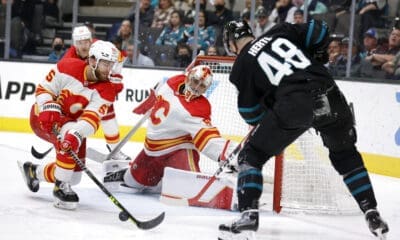Calgary Flames
A Lifelong Math Hater’s Surprising Love Affair With Advanced Stats

Math was always my least favourite subject in school. By a longshot. I remember long tutoring sessions with my father (a stockbroker) at the dining room table that extended late into the night, often ending in my frustrated tears as I struggled to improve my understanding of fractions and trigonometry.
It seems strange, then, that much of the hockey analysis I do in this space focuses heavily on advanced statistics, new metrics developed within the past decade that have helped us broaden our understanding of the game.
It was a slow process, to be sure. I had been blogging independently for under a year when Travis Hughes and the rest of the SB Nation crew took me under their collective wing, and instantly I felt like I was in over my head. Corsi, QualComp, ZoneStart, PDO, GVT*…what on earth was this stuff and how could I apply it to writing about my favourite team?
After many hours spent sifting through the Behind the Net archives, experimenting with Time on Ice scripts, and the help (and patience) of former contributors Robert Cleave and Kent Wilson, I gradually built an understanding of what these metrics were and how to use them to evaluate and compare players. It had finally clicked, and I was hooked; it all made so much more sense now. It seemed natural.
Advanced stats changed the way I write, the way I view the game, and my perception of certain players and what they are capable of. Do they have their downfalls? Of course, no system is perfect. Players surprise us all the time; looking at Jarome Iginla‘s underlying numbers over the course of the past few seasons, it appeared entirely unlikely that he would score 43-goals and 86 points last season as a 33-year old. Other aspects of the Flames‘ 2010-11 season, like Miikka Kiprusoff‘s drop-off in play and Rene Bourque‘s struggles without linemate Daymond Langkow, however, proved more predictable.
Advanced stats may be boring to some (I admit to skimming over number-laden pieces at times), and certainly aren't the answer to everything; sometimes I think my writing can rely a little too heavily on them. I admire the work of writers like Mitch and Arik who can prove their points eloquently without the use of numbers, but one cannot deny that they do have a predictive value, and should not be eschewed with a firm hand, but rather appreciated for what they are (and for what they aren't) and approached with a balanced point of view.
Nerds aren't ruining hockey–far from it; those who refuse to acknowledge the merits of alternative ways of viewing and analyzing the game are.
*I still don't really understand GVT that well, can one of you nerds explain it to me please? 😉
by Hayley Mutch









